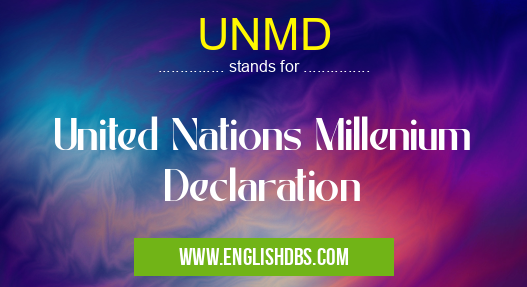What does UNMD mean in UNITED NATIONS
The United Nations Millennium Declaration is a document that was adopted by all 191 Member States of the United Nations at the Millennium Summit in 2000. The Declaration commits signatories to meeting a set of eight essential objectives, ranging from eradicating extreme poverty, to promoting sustainable development and protecting human rights, among many others. It has been hailed as an unprecedented and now widely accepted model for collective action in responding to global challenges and creating a better world.

UNMD meaning in United Nations in Governmental
UNMD mostly used in an acronym United Nations in Category Governmental that means United Nations Millenium Declaration
Shorthand: UNMD,
Full Form: United Nations Millenium Declaration
For more information of "United Nations Millenium Declaration", see the section below.
Description
The United Nations Millennium Declaration is a statement of intent, setting out the aspirations and expectations that the international community seeks to achieve towards its goals of a more peaceful, equitable and prosperous world. It outlines 8 Fundamental Objectives — peace and security; development; human rights; disarmament; protection of our common environment; promotion of democratic societies; combatting terrorism; tackling HIV/AIDS (among other infectious diseases) — each backed up by an extensive list of commitments. All these are intended to contribute to sustainable human development across all countries over the next fifteen years or so.
Impact
The UN Millenium Declaration has had significant impacts on how we understand and react to global challenges today. It has provided a framework for international collaboration on issues such as poverty reduction, health care access, education delivery, renewable energy utilization, combating climate change, safeguarding biodiversity and more. The declaration has spurred immense collaborations between countries and non-state actors leading to tangible outcomes for people around the globe. Over two billion people have been lifted out of extreme poverty since 2000 due largely in part to efforts inspired by this declaration.
Essential Questions and Answers on United Nations Millenium Declaration in "GOVERNMENTAL»UN"
What is the United Nations Millennium Declaration?
The United Nations Millennium Declaration is a global commitment to end extreme poverty, hunger, and other social ills while promoting human rights, democracy, and sustainable development. It was adopted at the UN Millennium Summit in 2000.
Who signed the United Nations Millenium Declaration?
In 2000, the governments of 189 nations signed the UN Millennium Declaration — a historic promise to protect our common future.
What are the eight goals established by the United Nations Millenium Declaration?
The eight goals are Eradicate extreme poverty and hunger; Achieve universal primary education; Promote gender equality and empower women; Reduce child mortality; Improve maternal health; Combat HIV/AIDS, malaria, and other diseases; Ensure environmental sustainability and Develop a global partnership for development.
How has the United Nations Millenium Declaration impacted global efforts to reduce poverty?
The UN Millennium Declaration set out ambitious targets to reduce poverty in all its forms across developing countries by 2015. This has mobilized aid funding from many donor countries, increased access to quality education for children around the world and improved healthcare services in underserved communities.
What progress has been made since adopting the United Nations Millenium Declaration?
Since 2000 there have been significant advances in tackling extreme poverty, reducing hunger and malnutrition as well as achieving gender equality. Over 1 billion people have been lifted out of extreme poverty since 2000 thanks to global collaborative efforts that began with signing of the declaration.
What role do governments play in executing the pledges made by signing onto the United Nations Millenium Declaration?
Governments play an essential role in translating commitments into actionable plans on national levels with support from international bodies such as UNESCO or WHO who provide technical assistance towards implementation when needed. Governments also collect data on progress against set goals which can be used to assess how policies need refining or adapting for further improvement.
Are there any gaps between policy implementation and achievement of target results related to United Nation Millenium Development Goals (MDGs)?
Yes, although much progress has been achieved since adopting the MDG's there still remain numerous gaps between implementation yet desired outcomes both domestically within individual countries but also consistently across regions due to various socio-economic factors that will impede or cause delays depending on location such as lack of resources or infrastructure etc.
Is it possible for individuals/civil society organizations (CSOs) to get involved directly if they want to contribute towards realizing UN's Millenium Development Goals (MDG)?
Yes absolutely! CSOs can work closely with their local governments engaging them more actively within a range of initiatives such as citizen consultative process while implementing MDGs allowing civil society input into decision making processes plus they are often best placed independently working with ground level communities who may not otherwise benefit from government led interventions.
How is youth engagement beneficial towards achieving MDGs outlined by UN's Millenium Development Goals?
Young people are key actors in development processes with great potential for responsible leadership plus their involvement provides fresh perspectives on how problems can be tackled differently than older generations plus they are often most affected by MDGs so their participation is necessary for successful projects delivering real results benefiting everyone.
Final Words:
Ultimately, the UN Millenium Declaration serves as both a reminder of our shared responsibility toward building a just and equitable future for all people everywhere, while also providing us with real tools to do it through collective action. While much more still needs to be done before we can realize the vision outlined in the declaration, it is important that we recognize this milestone from twenty years ago as having made an incredible difference in shaping how humanity responds together against shared global threats today.
